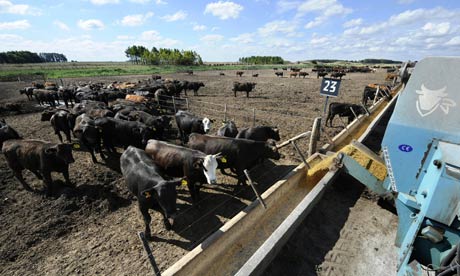Meat grown artificially in labs could be a greener alternative for consumers who cannot bear to go vegetarian but want to cut the environmental impact of their food, according to new research.
The study found that growing meat in the lab rather than slaughtering animals would generate only a tiny fraction of the greenhouse gas emissions associated with conventional livestock production.
The researchers believe their work suggests artificial meat could help feed the growing world population while reducing the impact on the environment.
According to the analysis by scientists from Oxford University and Amsterdam University, lab-grown tissue would reduce greenhouse gases by up to 96% in comparison to raising animals. The process would require between 7% and 45% less energy than the same volume of conventionally produced meat such as pork, beef, or lamb, and could be engineered to use only 1% of the land and 4% of the water associated with conventional meat.
"The environmental impacts of cultured meat could be substantially lower than those of meat produced in the conventional way," said Hanna Tuomisto, the researcher at Oxford University who led the study.
"We are not saying that we could, or would necessarily want to, replace conventional meat with its cultured counterpart right now.
"However, our research shows that cultured meat could be part of the solution to feeding the world's growing population and at the same time cutting emissions and saving both energy and water. Simply put, cultured meat is potentially a much more efficient and environmentally friendly way of putting meat on the table."
Aside from its predicted environmental benefits, lab-cultured meat should also provide cheap nutrition, and would help improve animal welfare as well as potentially taking huge pressure off farmland around the world.
Animal protein is an increasing part of diets, as millions of people in rapidly emerging economies such as China and India are drawn out of poverty and become able to afford more meat in their diets. The pressure this creates has been an important factor in rapidly rising grain prices, deforestation in the Amazon, increasing water scarcity and rising pressure to find new farmland, leading to "land grabs" where countries such as China buy up farmland in poorer nations.
Tuomisto predicts that if more resources are put into the research, the first commercially lab-grown meat could be available within five years. The first samples are likely to be like mincemeat in texture, while producing steaks could take at least five years longer.
"We can demonstrate that it is possible, but it is expensive. Getting to [commercial production] depends on more money being put into this research," she said.
The anti-meat organisation People for the Ethical Treatment of Animals is already funding research into the technique.
The Oxford-led research, to be published in Environmental Science & Technology, was funded by New Harvest, a non-profit research organisation working to develop alternatives to conventionally produced meat. An earlier version of the study was presented at a conference last year.
The study showed some of the complex implications of tissue engineering. For instance, it would take more energy to produce lab-grown chicken than it does for poultry, but would only use a fraction of the land area and water needed to rear chickens. But the research did not take into account other effects such as transport and refrigeration.
The research team based their calculations on a process using the bacterium Cyanobacteria hydrolysate as a nutrient and energy source for growing muscle cells.











